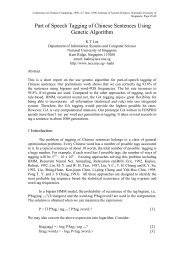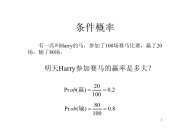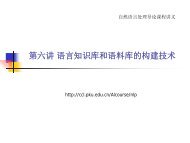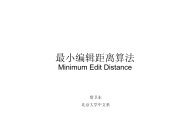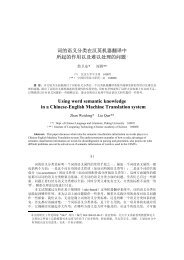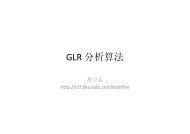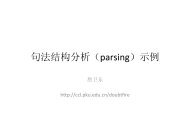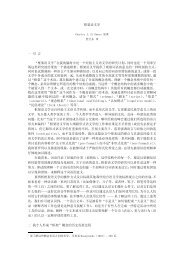A New Perspective On Chinese ZIJI
A New Perspective On Chinese ZIJI
A New Perspective On Chinese ZIJI
Create successful ePaper yourself
Turn your PDF publications into a flip-book with our unique Google optimized e-Paper software.
only by intervening c-commanding subjects with phi-features distinct<br />
from those of the putative binder. Clearly problematic for such accounts,<br />
then, is the fact, pointed out by Huang and Tang (1991), that<br />
an intervening subcommanding NP with distinct phi-features can also<br />
induce blocking. This fact is illustrated by the contrast between the<br />
(a) and (b) examples in (13) and (14):<br />
(13) a. Zhangsani renwei Lisij de jiaoao hai-le zijii=j. Zhangsan think Lisi DE arrogance harm-ASP self<br />
`Zhangsan i felt that Lisi's j arrogance harmed him i=j.'<br />
b. Zhangsani renwei woj de jiaoao hai-le ziji i=j.<br />
Zhangsan think I DE arrogance harm-ASP self<br />
`Zhangsani felt that my arrogance harmed *himi/me.' (14) a. Zhangsani renwei Lisij Zhangsan think Lisi<br />
neiyang zuo dui zijii=j that-way do toward self<br />
buli.<br />
not-bene cial<br />
`Zhangsan i felt that Lisi j acting that way didn't do him i=j<br />
any good.'<br />
b. Zhangsani renwei nij neiyang zuo dui ziji i=j<br />
Zhangsan<br />
buli.<br />
think you that-way do toward self<br />
not-bene cial<br />
`Zhangsani felt that your acting that way didn't do<br />
him i/you any good.'<br />
Observing (as noted in the preceding section) that subcommanding<br />
NPs can be antecedents of ziji, as can experiencer non-subject NPs,<br />
Huang and Tang contend that the blocking e ect is a property ofbinding,<br />
rather than an e ect of agreement. Speci cally, Huang and Tang<br />
conclude that the set of potential LD blockers is contained in the set<br />
of potential ziji binders. 4<br />
While we are in sympathy with Huang and Tang's view that the<br />
blocking e ect is not related to subject-In agreement, the aforementioned<br />
conclusion is untenable. For example, as noted in (1)-(2), direct<br />
or oblique objects are not potential ziji binders. However, examples<br />
like those in (15)-(18) show that both direct and oblique objects can<br />
induce blocking, just as subjects can:<br />
(15) Zhangsani gaosu woj Lisik hen ziji i= j=k.<br />
Zhangsan tell me Lisi hate self<br />
`Zhangsani told me Lisi hates *himi/*me/himself.' 4 In fact, this is entailed by most other current analyses as well.



